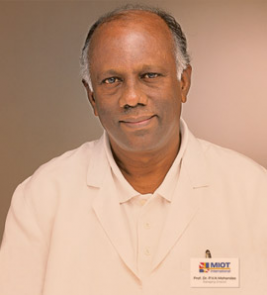MIOT Institute of Orthopaedics
Joint Replacement and Revision Surgery
Overview
At the renowned MIOT Hospitals Joint for Life programme, our experienced surgeons use the latest techniques and materials to find the perfect implant for every patient – one that suits their age, anatomy and lifestyle, and fits comfortably, enabling them to return to an active life.
Restoring mobility
Genetics, nutrition, activity and lifestyle are the cause for changes, over time, in our bones and joints. You could need a joint replacement surgery for a number of reasons: injury, bone disease, reduced blood supply, the wearing out of the joint due to wear and tear associated with age, etc. A joint replacement is a permanent solution to relieve pain and restore movement in the affected joint. Today, medical advancements have made it possible to replace our natural joints with artificial ones that are made from metal, polymers, ceramic or plastic. In the MIOT Joint for Life Programme, our expert surgeons perform replacement surgery of the knee, hip and shoulder. Backed by over 40 years of experience and more than 40,000 replacement surgeries and counting – MIOT Hospitals use current technologies and treatments to find that right implant to give you a joint that will last a lifetime.

Getting the right bond
- A detailed and accurate assessment of the bones and joints
- Finding and customising the implant so that it suits your age, physical activity and lifestyle
- Deciding on the surgical approach which will yield the best results
- Devising the right post-surgical physiotherapy regime
Choosing the right time and centre
Advanced facilities, expert surgical teams
A centre for revision surgery
Meet the Doctors

Prof. Dr. P.V.A. Mohandas
Padma Shri AwardeeM.B.B.S., M.S.Orth., M.Ch.Orth (Liverpool, England), D.Orth., D.Sc. (Hon) Chennai, D.Sc. (Hon) W. Bengal
Prof. Dr. P. V. A. Mohandas is the Founder & Mentor of MIOT International, and the Chief Surgeon of the department of Orthopaedic Surgery.
Prof. Dr. Mohandas completed his education at the Madras Medical College, where he later lectured in his chosen speciality. He then went abroad where he qualified further in Orthopaedics and worked in top institutions in Europe. He started MIOT Hospitals after he returned to India, initially as a hospital that focussed only on Orthopaedics and Trauma.
Dr. Mohandas has a long list of achievement in the field to his credit. Most notably, he was the first to perform a total hip replacement in this part of the country, introduced internal fixation of fracture for treatment of compound fractures in India, and pioneered total knee replacement in the country. He is also credited with having introduced modern methods of spine surgery and interventions.
He is one of the founders of the Indo-German Orthopaedic Foundation (IGOF), which promotes the collaboration between orthopaedic and general surgeons of both countries in the speciality.
He is a member of several professional medical bodies, and holds prestigious positions in them. He has also published several papers on various subjects pertaining to his chosen speciality.
Dr. Mohandas has received wide recognition for his contributions to healthcare in India, especially in his chosen speciality. He was awarded the Padmashree for pioneering Joint Replacement in India in 1992. Honorary degrees have also been conferred on him from the MGR Medical University, Chennai and the most recently, the University of Kalyani. He was awarded an honorary membership to the German Association of Joint Replacement Surgeons, at their annual congress in Heidelberg, Germany, and has the distinction of being the first ever surgeon to receive this honour.





